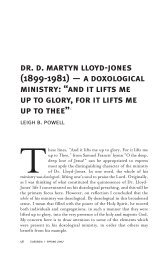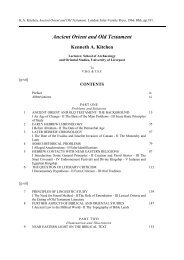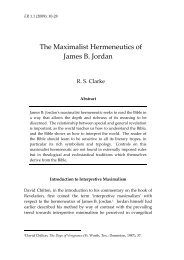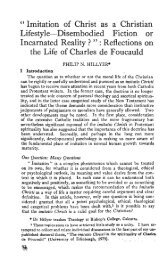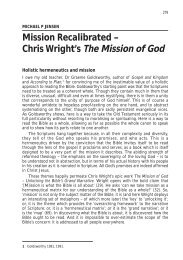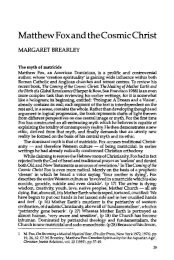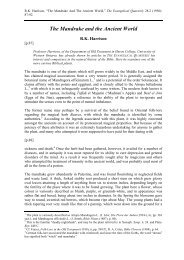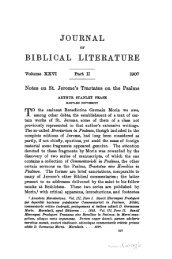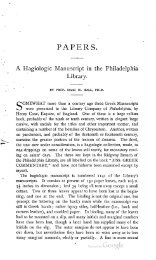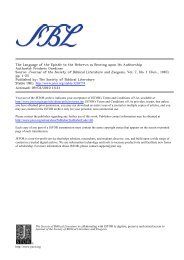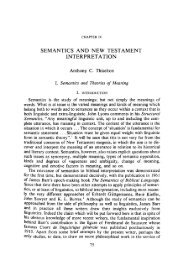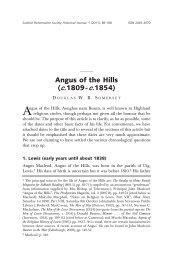Lutheranism in Russia and the Soviet Union: Another Response to ...
Lutheranism in Russia and the Soviet Union: Another Response to ...
Lutheranism in Russia and the Soviet Union: Another Response to ...
You also want an ePaper? Increase the reach of your titles
YUMPU automatically turns print PDFs into web optimized ePapers that Google loves.
256 Gerd Stricker<br />
that described above, for example a very strong Stundist movement <strong>in</strong> Kiev guberniya <strong>in</strong><br />
<strong>the</strong> late 1870s. In 1883 it was estimated that <strong>the</strong>re were between 3000 <strong>and</strong> 10,000<br />
Stundists <strong>in</strong> 'sou<strong>the</strong>rn <strong>Russia</strong>' (Diedrich, 1985, pp. 471f.).<br />
The fact that <strong>the</strong> word 'Stundism' has become so widely known is a success s<strong>to</strong>ry for<br />
<strong>Russia</strong>n propag<strong>and</strong>a, which was energetically directed aga<strong>in</strong>st anyth<strong>in</strong>g German <strong>in</strong> <strong>the</strong><br />
context of Great <strong>Russia</strong>n chauv<strong>in</strong>ism. 34 It was very h<strong>and</strong>y for <strong>the</strong> <strong>Russia</strong>n authorities <strong>to</strong><br />
be able <strong>to</strong> put a German label on any trouble <strong>and</strong> <strong>to</strong> blame alleged German 'saboteurs'<br />
who were stirr<strong>in</strong>g up unrest among <strong>the</strong> <strong>Russia</strong>ns <strong>and</strong> prepar<strong>in</strong>g <strong>the</strong> ground for a military<br />
attack by <strong>the</strong> German Empire. This is <strong>the</strong> wider context with<strong>in</strong> which <strong>the</strong> concept of <strong>the</strong><br />
'Stundist movement' is <strong>to</strong> be unders<strong>to</strong>od: <strong>Russia</strong>n nationalist ideologues wanted <strong>to</strong> use it<br />
<strong>to</strong> foist on<strong>to</strong> <strong>the</strong> Germans_<strong>the</strong> responsibility for a movement among <strong>Russia</strong>ns <strong>and</strong><br />
Ukra<strong>in</strong>ians away from <strong>the</strong> Orthodox state church, <strong>to</strong> stigmatise <strong>the</strong> movement as a German<br />
<strong>in</strong>itiative <strong>and</strong> <strong>to</strong> warn genu<strong>in</strong>e <strong>Russia</strong>n patriots <strong>to</strong> keep away from it. This 'Stundism' has<br />
little more than an etymological l<strong>in</strong>k with <strong>the</strong> German 'Stunde'. True, it was <strong>in</strong>spired by<br />
German Pietists <strong>in</strong> <strong>the</strong> German Black Sea 'colony' villages, but from an ethnic po<strong>in</strong>t of<br />
view it was a <strong>Russia</strong>n-Ukra<strong>in</strong>ian movement.<br />
Various Matters<br />
Fila<strong>to</strong>v is <strong>in</strong>correct <strong>in</strong> say<strong>in</strong>g that <strong>the</strong> church led by Bishop Hara1ds KalniQs35 was ever a<br />
part of <strong>the</strong> Latvian Evangelical Lu<strong>the</strong>ran Church. KalniQs was appo<strong>in</strong>ted 'super<strong>in</strong>tendenC<br />
36 of <strong>the</strong> German Lu<strong>the</strong>rans <strong>in</strong> <strong>the</strong> <strong>Soviet</strong> <strong>Union</strong> <strong>in</strong> 1980 by <strong>the</strong> <strong>Soviet</strong> Council for<br />
Religious Affairs (CRA).37 He had been a Latvian pas<strong>to</strong>r <strong>in</strong> Riga but <strong>the</strong> CRA <strong>in</strong> Moscow<br />
named him as head of a church of Lu<strong>the</strong>ran Germans which was completely <strong>in</strong>dependent<br />
of <strong>the</strong> Latvian archbishop <strong>and</strong> <strong>the</strong> Latvian Lu<strong>the</strong>ran Synod <strong>and</strong> which had no connection<br />
with Latvia at all. When <strong>the</strong> <strong>Soviet</strong> <strong>Union</strong> collapsed Riga became <strong>the</strong> capital of a<br />
sovereign state. However, <strong>the</strong> parishes of which KalniQs was now bishop were located<br />
ma<strong>in</strong>ly <strong>in</strong> Siberia <strong>and</strong> Central Asia. The leadership of <strong>the</strong>se parishes could obviously not<br />
be based abroad, <strong>in</strong> Riga for example. In a res<strong>to</strong>ration of <strong>the</strong> pre-1917 situation, St<br />
Petersburg was designated <strong>the</strong> centre of <strong>the</strong> future ELCROS, but <strong>the</strong> elderly Bishop<br />
KalniQs, who was born <strong>in</strong> 1911, was not prepared <strong>to</strong> move <strong>to</strong> St Petersburg; his assistant<br />
Prof. Dr Georg Kretschmar 38 was <strong>the</strong>refore elected as deputy bishop <strong>in</strong> 1991 <strong>and</strong> lead<strong>in</strong>g<br />
bishop <strong>in</strong> 1994 (archbishop s<strong>in</strong>ce 1999). After retir<strong>in</strong>g as bishop of <strong>the</strong> ELCROS <strong>in</strong> 1994<br />
KalniQs was until his death <strong>in</strong> 1997 <strong>the</strong> bishop serv<strong>in</strong>g <strong>the</strong> four or five German-speak<strong>in</strong>g<br />
parishes <strong>in</strong> Latvia, but even <strong>in</strong> this role he was <strong>in</strong> no way subord<strong>in</strong>ate <strong>to</strong> <strong>the</strong> Latvian<br />
Evangelical Lu<strong>the</strong>ran Church or its archbishop.<br />
The 'United Lu<strong>the</strong>ran Church' <strong>and</strong> its founder, Joseph Baron, are part of <strong>the</strong> most recent<br />
his<strong>to</strong>ry of <strong>Lu<strong>the</strong>ranism</strong> <strong>in</strong> <strong>Russia</strong>, about which a good deal is as yet unclear. Amidst<br />
rumour, speculation, assertions <strong>and</strong> sl<strong>and</strong>er by those <strong>in</strong>volved it is impossible <strong>to</strong> establish<br />
<strong>the</strong> truth. Baron is an elusive <strong>and</strong> enigmatic figure who appeared <strong>in</strong> <strong>the</strong> Lu<strong>the</strong>ran world<br />
from an evidently Catholic background <strong>and</strong> was soon be<strong>in</strong>g prepared as his successor by<br />
Bishop KalniQs; later he disappeared <strong>in</strong><strong>to</strong> Catholic circles aga<strong>in</strong>, but now he is serv<strong>in</strong>g <strong>in</strong><br />
<strong>the</strong> St Petersburg parish of <strong>the</strong> Evangelical Lu<strong>the</strong>ran Church of Latvia <strong>in</strong> Exile as an<br />
auxiliary pas<strong>to</strong>r.<br />
In his article '<strong>Response</strong> <strong>to</strong> Fila<strong>to</strong>v <strong>and</strong> Step<strong>in</strong>a on <strong>Lu<strong>the</strong>ranism</strong> <strong>in</strong> <strong>Russia</strong>' (RSS, 31, 4,<br />
December 2003, pp. 385-90) Baron compla<strong>in</strong>s that <strong>the</strong> 'United Lu<strong>the</strong>ran Church' was<br />
manipulated <strong>in</strong><strong>to</strong> <strong>the</strong> ELCROS; but <strong>the</strong> reality is very far from clear. In St Petersburg at<br />
<strong>the</strong> time many people were of <strong>the</strong> op<strong>in</strong>ion that <strong>the</strong> 'United Lu<strong>the</strong>ran Church' <strong>in</strong> fact<br />
comprised just one or two real parishes <strong>and</strong> that <strong>the</strong> o<strong>the</strong>r five or six,39 which were always<br />
be<strong>in</strong>g talked about, existed only on paper. It was said that Baron was proceed<strong>in</strong>g with <strong>the</strong>




